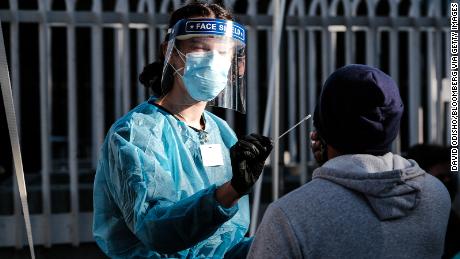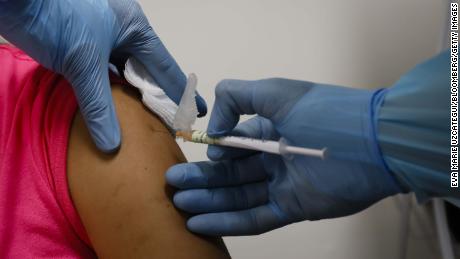Over the course of the pandemic, 273,799 people in the US have died of the virus and more than 13.9 million have been infected, according to
data from Johns Hopkins University. The record comes as the US suffers climbing cases and hospitalizations that mirror the devastation of the spring but that health experts warn will get even worse further into winter.
Covid Tracking Project. The number of hospitalizations had been steadily growing over the course of last month, setting records nearly every day since November 10, and experts worry health care systems will soon feel the strain.
“Without additional relief, it seems likely to break, even as we enter the third surge of the virus in the Mid-West and West,” the letter said.
And the Centers for Disease Control and Prevention top official said Wednesday things aren’t likely to look better for hospitals any time soon.
“The reality is December and January and February are going to be rough times. I actually believe they’re going to be the most difficult time in the public health history of this nation, largely because of the stress that’s going to be put on our health care system,” said Dr. Robert Redfield.
Los Angeles tells residents to ‘cancel everything’
States across the US are racing to catch up with the skyrocketing number of coronavirus hospitalizations.
If the coronavirus continues to spread at its current, unprecedented rate, Los Angeles will run out of hospital beds by Christmas, Mayor Eric Garcetti warned in a news conference Wednesday, calling on residents to “hunker down” and “cancel everything” to help stop the spread of the virus.
“The public health condition of our city is as dire as it was in March in the earliest days of this pandemic,” he said, adding that the number of daily coronavirus infections in Los Angeles has tripled since early November and hospitalizations are at a new peak.
In the Southwest region of Kansas, Gov. Laura Kelly said Wednesday there are no staffed ICU beds available.
“While case numbers may have dipped slightly, the strain on our hospitals and health care workers has not,” she said.
Coronavirus hospitalizations in Nevada have been climbing daily since November, with few exceptions, and were at a peak Wednesday with 1,652 people hospitalized, the state’s dashboard shows.
100 million could be vaccinated by February
There may still be ways to go before the wider public has access to a coronavirus vaccine, but developments are moving quickly.
By February, 100 million Americans could be vaccinated against coronavirus, Moncef Slaoui, chief adviser to Operation Warp Speed, said Wednesday.
“All the investments we have made in scaling up and starting to stockpile manufacturing of the vaccines allow us to stay confident that we will be able to distribute 20 million vaccines, enough to vaccinate 20 million people in the US in December,” Slaoui said in a news briefing.
The United States has said if both Pfizer and Moderna win US Food and Drug Administration emergency use authorization in December, they could distribute 40 million doses of the vaccine by the end of the month. Each vaccine requires two doses, so that’s enough to fully vaccinate 20 million people.
Slaoui said he expected 60 million more vaccines by the end of January.
An FDA panel is expected to meet about whether to authorize the Pfizer and Moderna vaccine candidates on December 10 and December 17, respectively.
Assuming the vaccines are authorized, the first shipments could happen December 15 and 22, respectively, according to a document from the federal government’s Operation Warp Speed.
A CDC panel recommended Tuesday that heath care and long-term care workers get inoculated first.
Dr. Paul Offit, a member of the FDA’s vaccine advisory group, said Wednesday that technology could help ramp up vaccine production enough to cover the global population.
“You really can, I think, in a couple years, be able to make enough vaccines to vaccinate 7 billion people,” he said. “There’s no reason to think that couldn’t happen.”
Vaccine trials for children set for 2021
Though vaccines are on the way, they have only been studied in adults and children older than 12.
Trials for younger children could start early next year, Dr. Francis Collins, the director of the National Institutes of Health, said Wednesday. We “very definitely need to get there,” Collins told CNN’s Wolf Blitzer.
“We will want to, shortly after the first of the year, also find out does this work for younger children because we know they can be infected and they can pass this along,” he said.
“So that is a next sort of level of test that’s going to need to be done in a … vaccine trial in order to be sure that the vaccine is safe and effective in that group,” he said.
“We think it will be, but we want to be sure,” said Collins.
the latest data available, nearly 1.2 million children have tested positive for Covid-19 since the pandemic’s start. And over just two weeks — between November 5 to November 19 — the number of child cases increased by 28%, according to the American Academy of Pediatrics and the Children’s Hospital Association.
Children now represent nearly 12% of all Covid-19 cases in the country.
CNN’s Steve Almasy, Jason Hanna, Shelby Lin Erdman, Raja Razek, Maggie Fox, Andrea Diaz, Jamie Gumbrecht, Jennifer Henderson, Rebekah Riess, and Lauren Mascarenhas contributed to this report.





